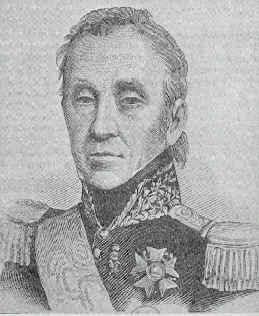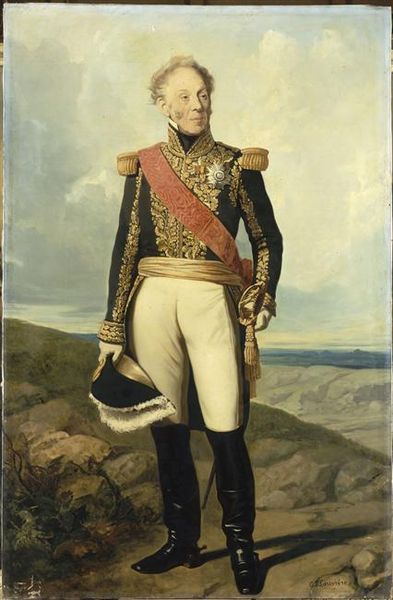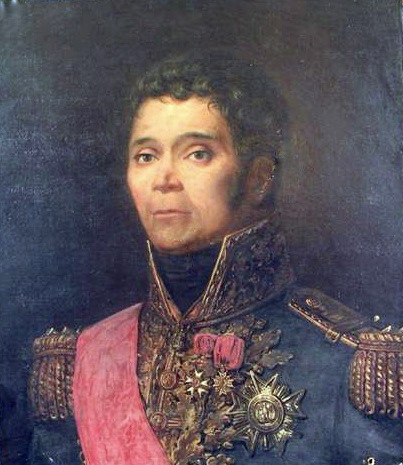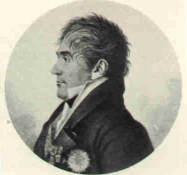<Back to Index>
- Commander of the II Cavalry Corps General Rémi Joseph Isidore Exelmans, 1775
- Commander of the III Cavalry Corps General François Étienne de Kellermann, 1770
- Commander of the IV Cavalry Corps General Édouard Jean - Baptiste Milhaud, 1766
PAGE SPONSOR


Rémi Joseph Isidore Exelmans, 1st Comte Exelmans (13 November 1775 – 22 June 1852) was a distinguished French soldier of the Revolutionary and Napoleonic Wars, as well as a political figure of the following period.
Born at Bar - le - Duc, he entered the army at 16, volunteering into the 3rd battalion of the French Revolutionary Army of the Meuse (1791). He became a lieutenant in 1797, and in 1798 was aide - de - camp to general Jean Baptiste Eblé, and in the following year to Jean - Baptiste Broussier.
In his first campaign in the Italian Peninsula he greatly distinguished himself; and in April 1799 he was rewarded for his services by the rank of captain of dragoons. In the same year he took part with honor in the conquest of the Kingdom of Naples and was again promoted, and in 1801 he became aide - de - camp to Joachim Murat.
During the First French Empire, he accompanied Murat in the campaigns against the Third and Fourth Coalitions (in the Austrian Empire, Prussia, and Poland, 1805 – 1807). At the passage of the Danube, and in the action of Wertingen, he specially distinguished himself; he was made colonel for the valor which he displayed in the battle of Austerlitz, and Brigadier General for his conduct in the battle of Eylau (1807).
In 1808, during the Peninsular War he accompanied Joachim Murat to Spain, but was there made prisoner by British troops, and conveyed to England. On regaining his liberty in 1811 he went to Naples,
where Murat, who reigned as King, appointed him grand master of horse.
Exelmans, however, rejoined the French army on the eve of Napoleon's invasion of Russia, and on the field of Borodino won the rank of Général de Division.
In the retreat from Moscow, his steadfast courage was conspicuously manifested on several occasions. In 1813 he was made a Grand Officer of the Légion d'honneur, for services in the Sixth Coalition campaign of Saxony and Silesia, and in 1814 he was noted for his role in the Six Days Campaign.
When the initial Bourbon Restoration
occurred, Exelmans retained his position in the army. In January 1815
he was tried on an accusation of having treasonable relations with
Murat, but was acquitted. Napoleon's return from Elba (the Hundred Days) made Exelmans a Peer of France, and placed him in command of the II Cavalry Corps during the Waterloo Campaign. On the 16 June the corps was involved in the battle of Ligny and two days later at the battle of Wavre. In the closing operations around Paris, he won great distinction on 1 July at the battle of Rocquencourt where units under his command destroyed a Prussian brigade of hussars under the command of Colonel von Sohr.
After the final Bourbon Restoration he denounced, in the House of Peers, the execution of Marshal Ney as an abominable assassination; thereafter, he lived in exile in the Southern Netherlands and Nassau for some years, until 1819, when he was recalled to France.
In 1828 he was appointed inspector general of cavalry; and after the July Revolution of 1830, he received from King Louis - Philippe the Grand Cross of the Légion d'honneur, and was reinstated as a Peer of France.
At the Revolution of 1848 Exelmans was one of the supporters of Louis Napoléon; in recognition of his long and brilliant military career, he was raised to the dignity of a Marshal of France in 1851. His death was the result of a fall from his horse.

Francois Étienne de Kellermann, 2nd Duc de Valmy (4 August 1770 – 2 June 1835) was a French cavalry general noted for his daring and skillful exploits during the Napoleonic Wars. He was the son of François Christophe de Kellermann and the father of the diplomat François Christophe Edmond de Kellermann.
Born in Metz, Kellermann served for a short time in his father's regiment of Hussars before entering the diplomatic service in 1791. In 1793 he again joined the army, serving chiefly under his father's command in the Alps, and rising in 1796 to the rank of chef de brigade. In the latter part of Bonaparte's celebrated Italian campaign of 1796 - 1797 the younger Kellermann attracted the future emperor's notice by his brilliant conduct at the forcing of the Tagliamento. He was made general of brigade immediately, and continued in Italy after the Peace of Campo Formio, being employed successively in the armies of Rome and Naples under Macdonald and Championnet.
At the Battle of Marengo (1800), he commanded a heavy cavalry brigade under the First Consul and he initiated and carried out one of the most famous cavalry charges of history, which, with Desaix's infantry attack, regained the lost battle and decided the issue of the war. On this occasion, Kellermann's depleted cavalry brigade, joined by a few squadrons of dragoons and other elements, in a perfectly timed charge, rode down three Austrian grenadier battalions. Then, he rapidly reformed his troopers, charged and routed an Austrian dragoon regiment. The dragoons stampeded through the Austrian array, causing a general rout.
He was promoted general of division at once, but as early as the
evening of the battle he resented what he thought to be an attempt to
belittle his exploit. A heated controversy followed as to the influence
of Kellermann's charge on the course of the battle, and in this
controversy he displayed neither tact nor forbearance. However, his
merits were too great for his career to be ruined either by his conduct
in the dispute or by the frequent scandals, and even by the frauds, of his private life.
Unlike his father's, his title to fame did not rest on one fortunate opportunity. Though not the most famous, he was perhaps the ablest of all Napoleon's cavalry leaders, and distinguished himself at the Battle of Austerlitz in command of a light cavalry division on the left flank. In Portugal under Jean - Andoche Junot, Kellermann led the grenadier reserve at the Battle of Vimeiro and used his considerable diplomatic skills in negotiating the Convention of Cintra. At the Battle of Alba de Tormes on 28 November 1809, he led 3,000 troopers in a brilliant cavalry charge that routed Duke Del Parque's Spanish army. He served with distinction on other occasions in the Peninsular War. His rapacity was more than ever notorious in Spain, yet Napoleon met his unconvincing excuses with the words, "General, whenever your name is brought before me, I think of nothing but Marengo."
He was on sick leave during the Russian expedition of 1812, but in 1813 and 1814 his skill and leading were as conspicuous as ever. He retained his rank under the first Restoration, but joined Napoleon during the Hundred Days, and commanded the III Cavalry Corps in the Waterloo campaign.
He led his squadrons in a famous cavalry charge at the Battle of Quatre Bras on 16 June 1815. In this action, Kellermann was peremptorily ordered by Marshal Michel Ney to make a frontal charge on the Anglo - Allied line with the 770 troopers of Guiton's cuirassier brigade. Against cavalry doctrine, Kellermann called for an immediate gallop so that his men would not see how badly they were outnumbered. In four separate charges, the 8th and 11th Cuirassiers broke the 69th Foot and captured a color, scattered a Hanoverian battalion and sent the 33rd and 73rd Foot fleeing for the safety of a nearby wood. The horsemen briefly seized the crucial crossroads, but the odds were too great. Unhorsed, Kellermann narrowly escaped by holding onto the stirrup of one of his cavalrymen.
At Waterloo, he was wounded. Initially, Kellermann's two divisions were deployed in support of the infantry in the left center of the line. Early on, cuirassiers — either Kellermann's or Milhaud's — destroyed a carelessly deployed Hanoverian infantry battalion. In the afternoon, Ney sent the III Cavalry Corps into a mass attack against the British infantry squares between Hougoumont and La Haye Sainte. At some time in the late afternoon, cuirassiers — possibly Kellermann's — rode down the 5th and 8th King's German Legion battalions. But the futile and repeated charges against the main Allied line failed to break a single square and used up the magnificent French cavalry.
Kellermann was disgraced at the second Restoration, and, on succeeding to his father's title and seat in the Chamber of Peers in 1820, at once took up and maintained till the fall of Charles X in 1830 an attitude of determined opposition to the Bourbons. He died on 2 June 1835.

Édouard Jean - Baptiste Milhaud (10 July 1766 – 8 January 1833) was a French politician, Général de Division, and comte d'Empire.He is considered as one of the best general of cavalry of Napoleon's army.
Born in Arpajon - sur - Cère (Cantal) as the son of Louis Amilhaud and Marguerite Daudé, Milhaud was commissioned as an officer in 1789. Milhaud was elected to the National Convention and in the proces of Louis XVI he voted for the death of the king. He defended Jean - Paul Marat against the attacks of the Girondins. In 1793 he was send as a commissary to the armies of the Rhine and the Ardennes where he distinguished himself in his severity. Sent to the army of the Pyrenees, he was successful in aiding Dugommier in restoring order. He was recalled the next year and made a member of the military committee.
After the fall of Robespierre, Milhaud was threatened with arrest but
saved from this fate by his colleagues on the military committee. His
political role effectively over, he was recalled to the army and he
became commandant of the 5th dragoons and was sent to the Army of Italy. Milhaud distinguished himself at Brenta and in the battle of Bassano.
The following year he was again accused because of his role during the
Terror but the Council of Elders decided not to act on the accusation.
Milhaud took an active part in the conspiracy leading up to 18 brumaire.
Promoted to general de brigade in January 1800 he was employed in the
army of England and was made commander of the 8th military division in
the Vaucluse.
During the War of the Third Coalition he served under Joachim Murat in the campaign leading up to the great battle of Austerlitz in which he took part. The next year on the outbreak of the War of the Fourth Coalition, Milhaud distinguished himself at Jena. On 28 October 1806, he forced the 6,000 men of the corps of Prince Hohenlohe to capitulate. At the end of 1806 he was promoted to general de division and in 1807 he distinguished himself at Eylau.
His performance brought him to the attention of Napoleon Bonaparte, and having already been awarded the Légion d'honneur, on 10 March he was made as a count. From 1808 until 1811 he fought in the Peninsular War. In November 1811 he was put on disponsability but in June 1812 he was recalled to active service and made commandant of the 25th military division.
In 1813 he commanded a cavalry corps at the Battle of Leipzig. He fought, October 10, 1813, in the plain of Zeitz, one of the best fights of cavalry which mentions the French military annals, and in which he completely destroyed regiments of Austrian dragoons of Latour and Hohenzollern, as the light horses of Kaiser. Based on his experience with these commands in 1814 Milhaud became Inspector General of the cavalry. During the first Restoration he was given command of the 15th military division by Louis XVIII.
During Napoleon's Hundred Days, he supported Napoleon, and in the Waterloo campaign he commanded the IV Cavalry Corps. At the Battle of Ligny on 16 June 1815 with his cuirassier divisions he broke the center of the Prussian army and helped to create Napoleon's last victory. Two days later at the Battle of Waterloo 18 June his divisions took part in the great general cavalry attack on the allied center, a plan he had opposed but had to execute, which ultimately proved a failure.
After the second restoration Milhaud was banished by King Louis XVIII as a regicide. After the July Revolution in 1830, he was called back to France, but died on 8 January 1833 in Aurillac.